Pronouns - Taking the Vague and Making it Familiar
Introduction
Children begin using simple pronouns at around three years of age. Once a child reaches school age, if they struggle with the proper use of pronouns in expressive language, this should be a cause for questions or concerns.
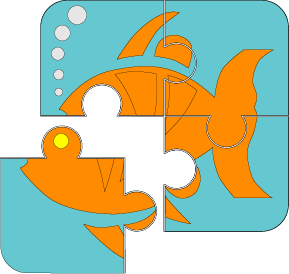
Here is yet another piece to the puzzle as a whole. Throughout my discussions, I mention several times that many students with Autism Spectrum Disorder (ASD) exhibit a lack of attention to details. I also discuss the lack of self-identity and the use of third person when ASD kids refer to themselves. For these reasons, among others, students often need a great deal of direct teaching and practice with proper pronoun usage. Most of us acquire proper pronoun use naturally, as we mature, through hearing and using language.
For students with ASD, the acquisition of proper pronoun use is less likely to happen without direct instruction.
Speech Kingdom's Pronouns - Who, How, and When
Who
I use the Speech Kingdom Pronouns game in my first grade class with ALL of my students. Yes ALL, including my neuro-typical students. Why is this?
Even young students who use pronouns in their expressive language need to develop more sophisticated skills.
Also... my students want in on the action! They have seen or heard about Speech Kingdom in my classroom and want to see what all of the excitement is about. This is what I refer to as a "natural hook" that happens to make teaching my students (in other words, my job) that much easier.
My kids have a curiosity that makes them want to learn!
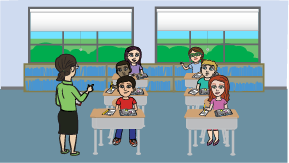
Students with ASD struggle with the vagueness that pronouns can leave them with. English Language Learners (ELL) struggle with the vagueness that pronouns can leave them with. Many neuro-typical kids struggle with the vagueness that pronouns can leave them with.
Q: So with whom do I use Speech Kingdom's Pronouns game?
A: EVERYONE!
- Parents can use Speech Kingdom's Pronouns game for fun and productive one-on-one time with their kids.
- SLPs, Behaviorists and other therapists can use Speech Kingdom's Pronouns game in their therapies
- Teachers can use Speech Kingdom's Pronouns game in one-on-one sessions or with groups of students
Similar instruction by varied providers across multiple environments leads to increased generalization of skills.
How
Speech Kingdom offers its Pronouns Game with four levels of difficulty plus a random option that encompasses all four levels. These difficulty levels are graphically depicted and presented as options as soon as the game is selected.

Fundamental Level
This level offers repetitive practice with pronouns "I" "Me" and "You" with a selection bank of only one choice. Obviously, students are always correct because there is only one choice. This level is based on the premise that, if a skill is repeated often enough, it sticks.

Beginner Level
The beginner level offers sentences with only blank (missing pronoun) and a selection bank of up to three choices. Since there is more than one choice offered, students must determine the correct pronoun. I can choose from one to eight pronoun groups to work with with.
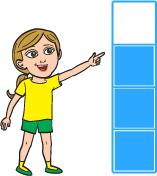
Intermediate Level
Things really start to "heat up" in the intermediate level. Some sentences have one missing pronoun, while others have two. The pronoun selection bank has also grown to up to six choices. The concept of proper name / pronoun swapping is introduced as students replace character names with their appropriate pronouns.
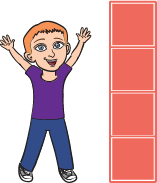
Proficient Level
The proficient level offers more complex thoughts via one or two more advanced sentences. The pronouns bank has now grown to up to eight choices. The difficulty level of the pronouns offered has also become more complicated, with the introduction of plural and possessive pronouns.
Customize All Settings
I started using this option after I fully understood all of the preset levels. The Customize All Settings option allows me to access all of the settings from the Game Settings menu, including the option to randomly select sentences and pronoun sets from all levels.
My Favorite Pronouns Features
I like the fact that each pronoun sentence set includes tools to help my kids understand the context of each scene.
- Many scenes include my student. This is super useful, especially when teaching "I" "Me" and "You."
- Scenes include many of my student's familiar Speech Kingdom friends from social stories and from fundamental skills mini-stories.
- The character who is speaking is identified with a familiar orange glow, just as in the fundamental skills mini-stories.
- The "Look Who's Talking" feature, through an audio prompt, identifies that character who is speaking.
- An explanatory reference sentence brings further context to the process, through text and/or audio.
- I can control the level of prompting and behavior upon success, which comes in handy; especially when there are multiple pronoun blanks in the main fill-in-the-blank sentence.
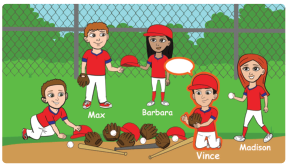
Through the many features that support audio and video prompting, students can always see and hear who the speaker is, reducing vagueness and increasing attention and learning.
Again, what I like to call a bonus feature is that the student's avatar is often in the scene or featured as the speaker. My students get totally excited to see if and when their avatar will appear on the screen. This only serves to heighten student awareness and ultimately, student engagement.
Depending on which mode I choose, I can work on different skills. Regardless, I always have the opportunity to choose the number of sets I would like presented in the game. I always begin with 5, increase to 10, and continue to work up from there as a student is able to sustain longer periods of attention. You will be able to make this decision based on the performance of your student(s).
Sitting Down and Working with my Students
When introducing the pronouns game to my whole class or a small group, I use the program as I would any other program or lesson that I teach to the entire class.

When I use the pronouns game in a one-on-one situation with a single student, I usually start with the fundamental level. This helps to ensure that there are no gaps in the process. I pay attention to my student's needs, and sometimes quickly advance to the beginner level.
I spend some time having discussions with each student about the scenes. We talk about everything that is going on in each picture.
We always identify the character who has the orange glow. I make sure to indicate that this is the speaker. I can support this with the Look Who's Talking audio feature.
We listen first to the audio of the contextual explanation and then to the fill-in-the-blanks sentence audio.
Sometimes, my students like to click on the items in the pronoun bank to hear the audio for each individual word.

Next, I ask, "What word goes in the blank." Obviously, in the case of sentences with multiple blanks, or proper name replacement, I adjust my question accordingly.
Repetition is key. Especially at the beginning. I remind my students that NBA players practice making free-throws over and over because, "If you do something 10,000 times, you can probably do it whenever you need to."
Rewards and Reinforcers
Speech Kingdom provides an extensive library of rewards and reinforcers. These animations add to a student's feeling of accomplishment and help to maintain their interest and focus. His or her avatar might hit a baseball out of the park, do a cannonball into a pool, perform gymnastics, or one of many other choices. I can choose the reinforcer or let Speech Kingdom randomly choose from their extensive library, to celebrate accomplishment. I like to begin by choosing a reinforcer based on the child's interests and notice a high level of interest and concentration when my students know that they will be rewarded at the end of each round of sets.

I often change the reinforcers that I use. It's easy. When I do so, my students look forward to the unexpected positive experience of being surprised with a new animation, such as seeing their avatar swing a light saber or perform karate.
As the reinforcers change, some students express their desire to see specific animations. I take advantage of this by allowing them to choose the reinforcers themselves. I notice that when I give my students a choice, they feel more independent and engaged.
Remote Control and Rewards
Important note: There is a fantastic option to remotely control my student's device from my device and to turn off certain functions such as navigation (prev, next, exit) on his or her device as well. It is explained in detail in the Help page of this website under Student Mode — Remotely Controlling a Student's Device. When I use this I also take advantage of another option called Activate Reinforcer. Once the story is running, I can select Activate Reinforcer from my Story Settings menu (Gear icon in top right corner) and reward my student when he or she does something great, or just needs some support.
Using the Remote Control feature along with the Activate Reinforcer option allows me to invoke a reinforcer animation on my student's device at any time during a game.
When
My current class is first grade and I use the pronouns game as part of my core instruction... even for neuro-typical kids. This can vary from grade to grade, but for pre-K and above, it is an ideal tool for all kids, not just for ASD, ESL, and ELL kids. I find that its varying levels of difficulty make Speech Kingdom's Pronouns game great for all kids who need help with this tricky subject.
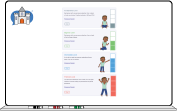
In my classroom, I project Speech Kingdom through my smart board and use it with a group of students who need help with the acquisition of the same group of pronouns. I have been successful using pronouns with individuals as well. Sometime I make Speech Kingdom's Pronouns a center during what we call "center time" and I use it individually with students on their Chromebooks to check for understanding and mastery.
I love the fact that my Speech and Language therapist, my kids' parents, and I have the ability to use the same tool. Ultimately, this allows us to compare "apples to apples" when IEP meetings come up.
Generalization is a Key Goal
Using Speech Kingdom's Pronouns game across multiple therapies with multiple professionals in multiple environments tremendously helps students to generalize their skills.
In Conclusion
Proper use of pronouns can be a tricky skill to learn. This is especially true for
- Kids on the Autism Spectrum (ASD)
- Kids whose English is a second language
- Other who, for some reason, never acquired this skill naturally
I find Speech Kingdom's presentation and implementation to be ideal. The approach of providing critical context through visual and through audio means is absolutely brilliant.
My students thoroughly enjoy seeing and hearing themselves in the process, and the reinforcers are just the "icing on the cake."
I suspect that if you read my pieces on Fundamental Skills Mini-Stories and Social Stories, you are seeing the overlaps in education that the folks at Speech Kingdom provide. They work diligently to provide opportunities and learning for the entire child. By overlapping skills throughout the application, students learn and use those skills, repeatedly, in a variety of contexts. This naturally reinforces the skills. Children with ASD and those with other needs who benefit from Speech Kingdom tend to lack attention to detail. Speech Kingdom takes a direct approach to improving and reinforcing skills that these students desperately need.
As I use the application, I find that there is a multitude of skills that can be drawn out and focused upon. I have adapted my use of Speech Kingdom for individual students, focusing more on certain skills and less on others, depending on student needs at the time.

A final point to remember is that when we struggle with something, we tend to avoid it. Struggle often creates aversions. If I can create a sense of curiosity in my students and it they have fun during the process, each will want to return to Speech Kingdom, and often.
Just like all of the other games in this app, Speech Kingdom's Pronouns game works so well because it is super fun!
Sincerely,
Heidi Otterman,
1st Grade Teacher

